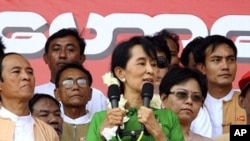Burma's pro-democracy leader Aung San Suu Kyi has traveled to the Irrawaddy delta for the first time since 1989, with enthusiastic crowds gathering to greet her as she attempts to round up support for her party in upcoming by-elections.
Freed after years under house arrest, the Nobel laureate is running for one of 48 parliamentary seats vacated by lawmakers who were appointed to the Cabinet and other posts in the government in last year's transition from military to civilian rule.
But even if her National League for Democracy party sweeps the polls in April, it has no chance of winning the majority in the 440-seat lower house of Parliament. The lawmaking body is heavily weighted with military appointees and allies of the former ruling military junta.
Burma's military-backed civilian government has undertaken a series of dramatic political reforms since taking power last March, including the release of hundreds of political prisoners, the holding of peace talks with ethnic rebels and the allowance of greater press freedoms.
Late Monday, the United States announced it has eased one of its many sanctions against Burma in response to the government's moves toward democratic reforms.
The State Department said it is lifting opposition to assessments of Burma by international financial institutions, in a move that will make it easier for the country to secure help from organizations such as the World Bank or the International Monetary Fund.
Burmese Pro-Democracy Leader Takes Campaign to Irrawaddy




